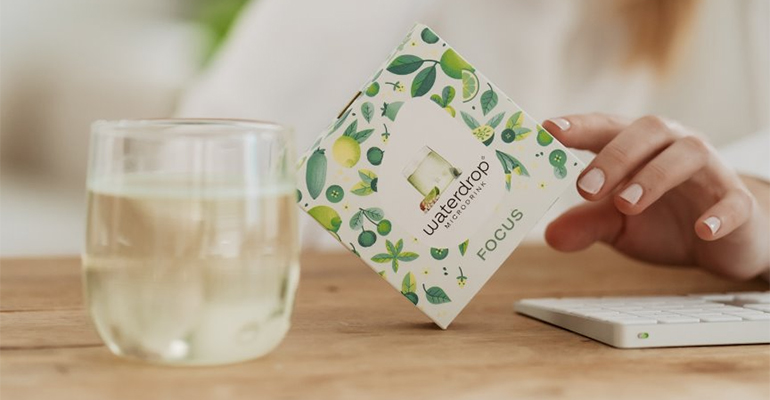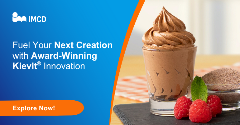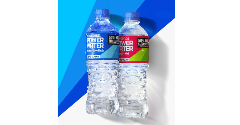News
Microdrink startup Waterdrop expands in US, looks to move global
24 Feb 2022
Australian beverage startup Waterdrop has raised €60 million ($70 million) in a Series B funding round led by Singapore-based investment firm Temasek. The startup, which makes microdrinks — water-soluble, sugar-free cubes packed with plant-based wellness ingredients — said it will put its new funding toward R&D as well as continued expansion globally.
Currently, the company offers four flavors of its microdrinks, all touting different functional benefits through the use of ingredients such as elderflower, acai, ginger, ginseng, aloe and lemongrass. Boxes of each flavor are sold in an individually-packaged cube format to enhance the sustainability of these products as compared to other beverage options.

According to the company, it is not only functional beverages that are giving it a leg-up over other competitors, but the way in which it sells its products allows for consumers that are interested in hydration to simultaneously lower their carbon footprint. “Waterdrop eliminates up to 98 percent of unnecessary packaging and CO2 emissions compared to the transport of traditional bottled drinks,” the company said in a statement.
Despite these strides toward reducing its carbon footprint, the company’s packaging still packages its individual microdrink cubes in plastic to enhance shelf life and prevent the deterioration of the product's quality. While single-use plastic can be made from recyclable polymers, it is not always accepted in curbside collection programs.
By offering sustainability and functionality in its beverages, Waterdrop is tapping into two major trends, and its growth is reflective of the success of this approach. Last year, following five years of 400% year-over-year growth in Europe, the company launched its products in the U.S. Growth continues to remain a focus for the company, and in 2022, the company aims to triple its revenue from its $10 million (€881,329) in sales earned in 2021.
Waterdrop's lofty aims are pitting it against some major players in the beverage space as the microdrink market has seen an explosion of interest in the last several years. Major companies like Nestlé are getting into the game through the acquistion of the microdrink company Nuun, a company selling dissolvable hydration tabs. Startups such as U.S.-based LifeFuels, which creates sugar-free, zero-calorie and electrolyte-filled pods, have emerged. And there is even variety withing the segment from companies like Tea Drops, a recently-funded startup that creates “bath bombs for tea.”
This emerging functional drink segment exists alongside other major markets such as functional water, which offers many of the same benefits of these microdrink options, except it comes fully prepared in bottles — water included.
Related news

Oat Barista: Innovation for game-changing beverages
20 Nov 2025
Oat Barista is a clean label, sustainable, and innovative drink base specifically designed to create the perfect foam in one single ingredient.
Read more
How younger consumers are redefining ingredient choices and rejecting brand loyalty
18 Nov 2025
Gen Z and millennial consumers’ preferences for transparency, functionality, and purpose are “redefining the very nature of consumption itself”, says SPINS.
Read more
Hybrid formats and flexible positioning to disrupt category norms in 2026
17 Nov 2025
Trend forecasters expect food and drink to move more fluidly across occasions, functions, and formats as consumers seek versatility, novelty, and convenience.
Read more
Danone highlights digestive health as potential ‘tipping point’ for food industry
13 Nov 2025
Danone is betting on a food industry “tipping point” that will bloat the market for healthy products, particularly those related to gut health.
Read more
New UPF standard hoped to offer consumers ‘coherence and clarity’
10 Nov 2025
Ingredients companies are being urged to enter “a new era of partnership and innovation” following the launch of the industry’s first non-UPF verification scheme.
Read more
Faravelli at Fi Europe: Showcasing FARA® functional solutions for food and nutra
28 Oct 2025
At Fi Europe 2025 in Paris (stand 72M39), Faravelli showcases FARA® Customized Functional Solutions and a wide ingredient portfolio for food and nutra – delivering quality, innovation, and expertise.
Read more
Agrigum Redefined FIBER
27 Oct 2025
Agrigum has transformed gum acacia into a natural, science-backed fibre that supports gut health, sustainability, and innovation across global food and nutrition applications.
Read more
Expanding boundaries in food & beverage innovation
23 Oct 2025
IMCD and FrieslandCampina Professional expand partnership to deliver Kievit® across EMEA, enabling brands to enhance quality and accelerate time-to-market for tomorrow’s food & beverage creations.
Read more
Amazon Grocery launch aims to balance quality with affordability
22 Oct 2025
Global e-commerce giant Amazon has introduced a new private-label food brand, combining existing Amazon Fresh and Happy Belly products with new everyday items.
Read more
Powerade enters hydration space with launch of Power Water
21 Oct 2025
Coca-Cola’s Powerade brand has launched a zero-sugar, electrolyte-enhanced functional water, marking the brand's entry into the hydration space.
Read more